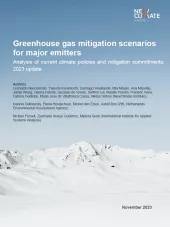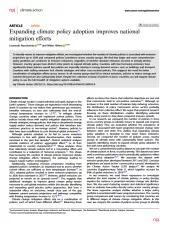This article is published in the Climate chronicles, which brings together Nature Reviews Earth & Environment's annual series of 'Year in Review' articles. In these pieces, leading experts outline the observed characteristics and changes to select climate metrics and policies over the year, collectively documenting the state of the climate and its ongoing evolution.
In 2023, national and international climate policy advanced in some areas but faced strong domestic hurdles, delays and rollbacks in others. This led to an aggregated standstill in expected global greenhouse gas emissions projections to 2030 for the second year in a row. This stands in stark contrast to the universal consensus on the need to urgently and immediately reduce emissions. Countries must increase coherence within and among countries, backed by strong international cooperation, to accelerate transformations towards the Paris Agreement goals.
Key points
- A tug of war between negative developments in some countries and positive developments in others is insufficient. Only with all countries moving in the same direction will climate policy reach the pace needed to safeguard sustainable development for all.
- Domestic developments are often contradictory, as demonstrated by the simultaneous expansion of coal and renewables in major emitters. Ensuring coherent climate policies within countries' borders remains fundamental to meeting the goals of the Paris Agreement.
- New initiatives and mechanisms to support international cooperation, such as the Global Renewables and Energy Efficiency Pledge, help to advance national and global climate policy but they will require credible national action to back them up.
Summary
International and national climate policies progressed on many fronts in 2023. Countries reached agreements on additional mechanisms for international cooperation, such as the JETPs and the Loss and Damage Fund, and many major emitters adopted additional climate policies aimed at driving future emissions reductions.
However, climate policy also regressed, as demonstrated by the UK's backtracking on its climate commitments. This apparent tug-of-war—where positive developments and negative developments cancel out—makes halving emissions by 2030 nearly impossible, leading to slow or stagnant global progress toward the Paris Agreement. Only with all countries moving in the same direction will climate policy safeguard sustainable and just development for all.
Additional international cooperation initiatives and climate policies without substance also do not necessarily reduce actual emissions and, in some cases, could hinder progress.
Some initiatives, such as the Oil and Gas decarbonisation Charter, will likely prolong the use of fossil fuels when they focus on improving the efficiency of fossil fuel use instead of adopting well-established technologies and behaviours to phase them out completely. Similarly, countries that set ambitious visions without adopting corresponding policies are another example of measures that lack substance and delay global progress.
However, there is a growing understanding that all sectors of the economy need to transition to zero emissions. Accordingly, there was a positive shift from merely setting goals and visions to anchoring those in national policymaking. The events of 2023 made it clear that climate policy coherence within and among countries remain necessary to accelerate global climate action.







